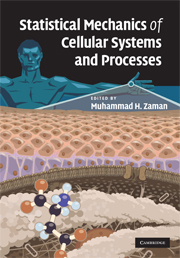Book contents
- Frontmatter
- Contents
- List of contributors
- Preface
- 1 Concentration and crowding effects on protein stability from a coarse-grained model
- 2 Observations on the mechanics of a molecular bond under force
- 3 Statistical thermodynamics of cell–matrix interactions
- 4 Potential landscape theory of cellular networks
- 5 Modeling gene regulatory networks for cell fate specification
- 6 Structural and dynamical properties of cellular and regulatory networks
- 7 Statistical mechanics of the immune response to vaccines
- Index
- Plate section
Preface
Published online by Cambridge University Press: 04 September 2009
- Frontmatter
- Contents
- List of contributors
- Preface
- 1 Concentration and crowding effects on protein stability from a coarse-grained model
- 2 Observations on the mechanics of a molecular bond under force
- 3 Statistical thermodynamics of cell–matrix interactions
- 4 Potential landscape theory of cellular networks
- 5 Modeling gene regulatory networks for cell fate specification
- 6 Structural and dynamical properties of cellular and regulatory networks
- 7 Statistical mechanics of the immune response to vaccines
- Index
- Plate section
Summary
While the application of statistical thermodynamics to study molecular biophysics such as proteins, nucleic acids, and membranes has been around for decades, only in the last few years, have researchers started to study hierarchical and complex cellular processes with the tools of statistical mechanics. The emergence of statistical mechanics in cellular biophysics has shown incredible promise for understanding a number of cellular processes such as complex structure of cytoskeleton, biological networks, cell adhesion, cell signaling, gene expression, and immunological response to pathogens. Collaboration with experimental researchers has led to results that are now emerging as promising therapeutic targets. These studies have provided a first-principle picture that is critical for developing a fundamental biological understanding of cellular processes and diseases and will be instrumental in developing the next generation of efficient therapeutics.
While there has been a surge in publications on topics in cellular systems using tools of statistical mechanics, no book has appeared in the market on this emerging and intellectually fertile discipline. This book aims to fill this void. The main purpose of the book is to introduce and discuss the various approaches and applications of statistical mechanics in cellular systems, in an effort to bridge the gap between physical sciences, cell biology, and medicine.
The book is organized such that the first few chapters deal with the physical aspects of cells' structure, followed by chapters on physiologically critical processes such as signaling, and concluding with a chapter on immunology and public health.
- Type
- Chapter
- Information
- Statistical Mechanics of Cellular Systems and Processes , pp. xi - xiiPublisher: Cambridge University PressPrint publication year: 2009

